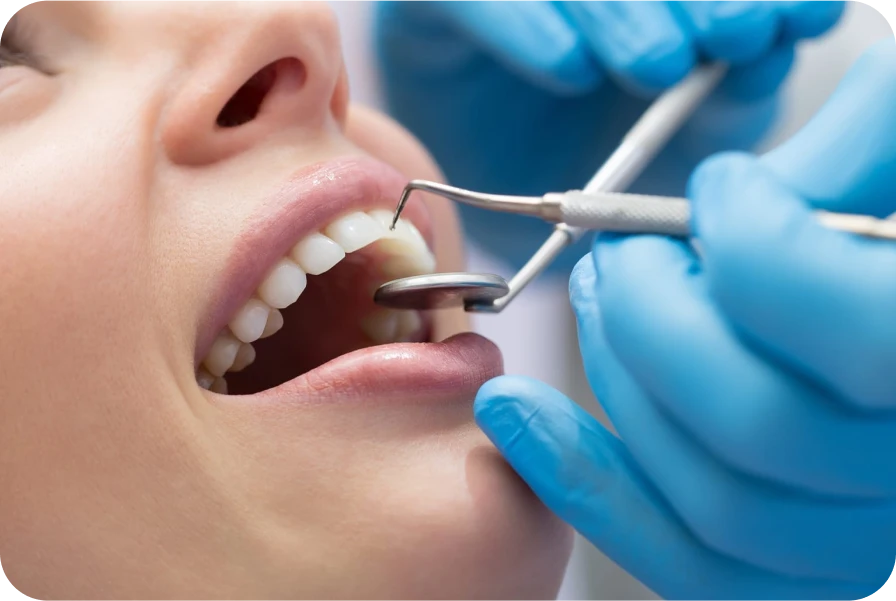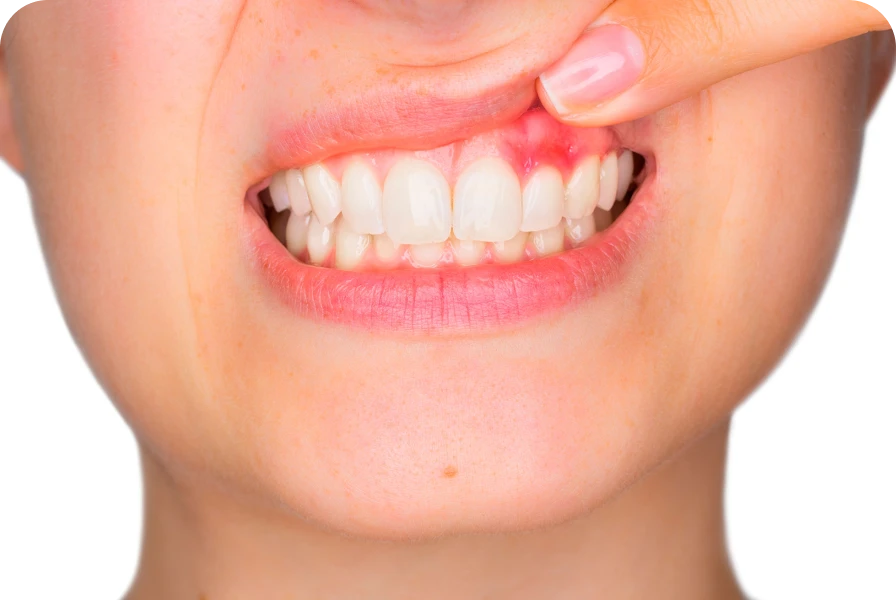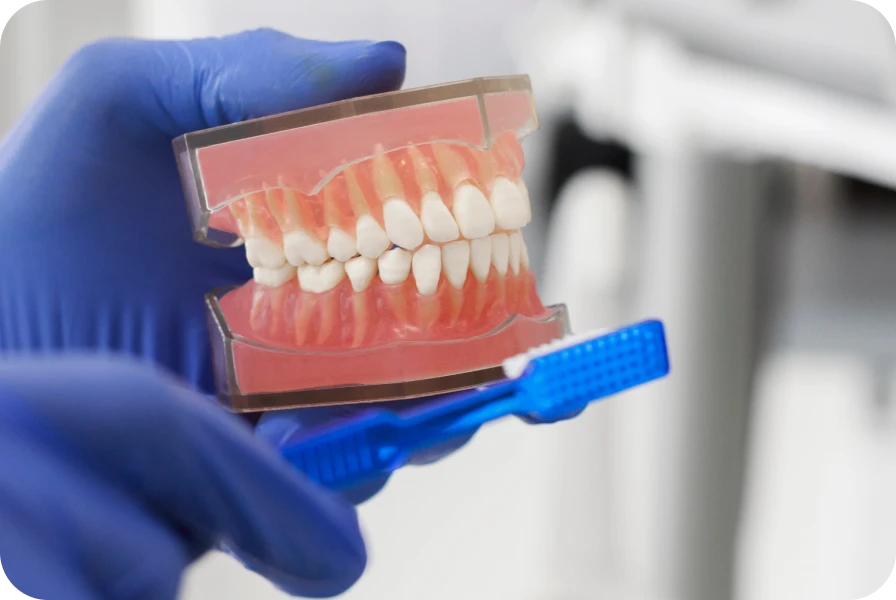Periodontitis
Identify the Early Signs of Periodontitis
Recognizing the symptoms of periodontitis is crucial. Consult your dentist at the first signs. Bleeding gums during brushing are a common indicator. Additionally, observe if your gums are red or swollen, as these symptoms often indicate inflammation. Another sign is persistent bad breath. Do not neglect these symptoms; act promptly to prevent complications.
Adopt Rigorous Oral Hygiene

To prevent periodontitis, adopt strict oral hygiene. Brush your teeth after every meal.
Use a soft-bristled toothbrush to avoid irritating the gums. Remember to floss daily.
Dental floss allows for cleaning between teeth, where a toothbrush cannot reach. An antibacterial mouthwash can also be beneficial.
It helps reduce inflammation-causing bacteria. Follow these recommendations to maintain healthy gums.
Avoid Risk Factors
Certain factors increase the risk of periodontitis. Tobacco is one of the greatest adversaries to your gums; it reduces blood supply to the gums, thereby weakening their ability to combat infections. Additionally, a nutrient-poor diet weakens the immune system. To mitigate risks, adopt a balanced diet rich in vitamins. Finally, stress can also play a role, as it weakens the immune system, making gums more vulnerable. Avoid these factors to preserve your gum health.
Consult a Dentist Regularly
Regular dental visits are essential. Do not neglect them. Even if your gums appear healthy, regular consultations enable the early detection of problems. Your dentist can remove tartar, which is difficult to eliminate with a toothbrush. Furthermore, they can advise you on the best brushing techniques. If you have a family history of periodontitis, discuss this with your dentist, as increased monitoring may be necessary.
Follow Appropriate Treatment
If you are diagnosed with periodontitis, follow the treatment prescribed by your dentist. The treatment will depend on the severity of the disease. In mild cases, a deep cleaning may suffice, which includes scaling and root planing. These procedures remove tartar and smooth the surfaces of dental roots, allowing the gums to reattach to the teeth. In more severe cases, surgical intervention may be necessary. Follow your dentist’s instructions precisely.
Adopt Preventive Measures after Treatment
After treatment, it is essential to adopt preventive measures. Continue to maintain rigorous oral hygiene. Do not smoke, as smoking increases the risk of recurrence. Furthermore, a balanced diet remains crucial. Avoid sugary or acidic foods that can damage the gums. Finally, remain vigilant for signs of recurrence; if you notice any symptoms, consult your dentist immediately.
Understand the Importance of Periodontal Care
Periodontal care is not limited to treating periodontitis; it also aims to prevent other oral diseases.
Good periodontal health contributes to overall health. Gum infections can affect other parts of the body; for example, they can increase the risk of heart disease. Therefore, take care of your gums, as they are essential for your overall health.
After treatment, it is essential to adopt preventive measures. Continue to maintain rigorous oral hygiene. Do not smoke, as smoking increases the risk of recurrence. Furthermore, a balanced diet remains crucial. Avoid sugary or acidic foods that can damage the gums.

Finally, remain vigilant for signs of recurrence. If you notice any symptoms, consult your dentist immediately.
Understand the Importance of Periodontal Care
Periodontal care is not limited to treating periodontitis; it also aims to prevent other oral diseases. Good periodontal health contributes to overall health. Gum infections can affect other parts of the body; for example, they can increase the risk of heart disease. Therefore, take care of your gums, as they are essential for your overall health.
Involve your Family in Oral Healthcare
Oral healthcare is not just for adults; it is also important for children. Teach your children proper brushing techniques from an early age. Encourage them to adopt a daily routine. Show them how to use dental floss. Furthermore, ensure they maintain a balanced diet. Limit sweets and acidic beverages. Children who develop good habits early will have a reduced risk of developing periodontitis in adulthood.
Understand the Links between Periodontitis and other Diseases
Periodontitis does not only affect the gums; it can also have repercussions on other parts of the body. For instance, there is a link between periodontitis and cardiovascular diseases. Oral bacteria can enter the bloodstream, potentially causing inflammation of blood vessels. This increases the risk of heart attack. Furthermore, periodontitis can complicate diabetes. Poor oral health can make diabetes management more challenging. Therefore, it is crucial to understand these connections and act accordingly.
Adopt a Holistic Approach to Prevent Periodontitis

Periodontitis prevention is not limited to oral hygiene alone; a holistic approach is necessary. This includes a balanced diet, stress management, and a healthy lifestyle. Avoid risky behaviors such as smoking and excessive alcohol consumption. Engage in regular exercise; physical activity helps strengthen the immune system. Finally, ensure adequate sleep, as good sleep contributes to tissue regeneration, including the gums. Adopt these habits to reduce your risk of periodontitis.
Raise Awareness of the Importance of Periodontal Care
It is essential to raise awareness of the importance of periodontal care. Many individuals are unaware of the risks associated with periodontitis. Discuss this with your acquaintances. Encourage them to consult a dentist regularly. Explain the consequences of untreated periodontitis, which can include tooth loss and general health complications. The more informed people are, the more likely they are to prioritize their oral health.
Stay Informed about New Available Treatments
Periodontitis treatments are constantly evolving. Stay informed about the latest advancements. Some new treatments are less invasive. For example, the use of lasers to treat periodontitis is becoming increasingly common, allowing for the targeting of infected tissues without damaging healthy gums. Furthermore, oral probiotics represent a promising new approach, helping to restore a healthy bacterial balance in the mouth. Consult your dentist regularly to discuss new treatment options.
Avoid Unproven Home Remedies
Some individuals attempt to treat periodontitis with home remedies. However, these methods are not always effective and can sometimes even worsen the condition. For instance, some people use essential oils as a treatment. While certain oils possess antibacterial properties, they do not substitute for professional dental care. Always consult your dentist before trying a home remedy; they can advise you on the best treatment options.
Understand the Underlying Causes of Periodontitis
Periodontitis has several underlying causes. Poor oral hygiene is the primary factor; however, other factors can also play a role. For example, medical conditions such as diabetes can increase the risk of periodontitis. Additionally, certain medications can affect gum health. For instance, drugs that reduce saliva production can lead to bacterial accumulation in the mouth. Understanding these causes facilitates better periodontitis prevention.
Maintain Regular Follow-Up after Treatment
After periodontitis treatment, regular follow-up is crucial. Do not miss your dental appointments, as this allows for monitoring gum healing and preventing relapse. If necessary, your dentist may adjust your treatment, for example, by recommending more frequent cleanings. Furthermore, regular follow-up enables the early detection of other oral health issues. Maintain open communication with your dentist to ensure the best possible care.
Improve Gum Health through Diet
A healthy diet plays a crucial role in gum health. Consume foods rich in vitamins and minerals. For example, vitamin C is essential for gum health, as it helps strengthen gingival tissues and prevent bleeding. Additionally, calcium-rich foods are important for teeth and bones. Include green vegetables, fresh fruits, and dairy products in your diet. Avoid sugary and acidic foods that can damage the gums.
